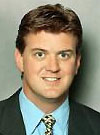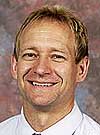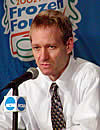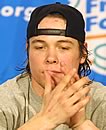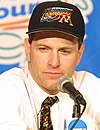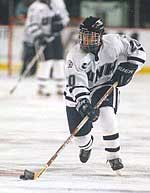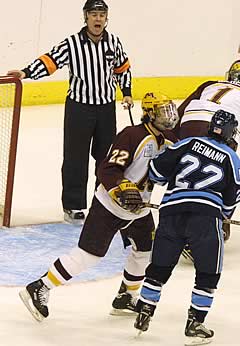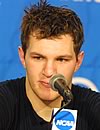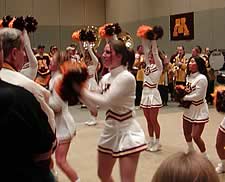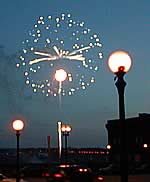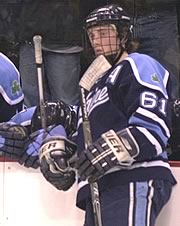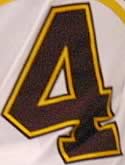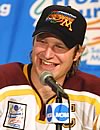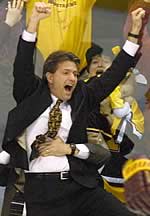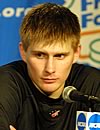When Grant Standbrook decided it was time to leave his first head coaching stint, after five years at Dartmouth, he wasn’t sure what awaited him around the next turn in the career path.
It was 1975, and there was a lot coaching left in him, that much he knew. Presumably — assuredly — that would be as a head coach again.
But when the legendary Badger Bob Johnson asked him to be an assistant for the 1976 U.S. Olympic team, and subsequently with him at Wisconsin, Standbrook figured maybe being an assistant again for a little while wasn’t so bad, even if his wife wasn’t sure.
“My wife says, ‘It will never work out, Grant. You’ll never be an assistant coach,'” says Standbrook. “I said, ‘I don’t know, Bob treats me just like a fellow coach.'”
It wasn’t long before Standbrook realized he garnered just as much fulfillment being an assistant as a head coach. He didn’t need the spotlight, he just needed the opportunity to do what he does best: teach young men how to be better … better hockey players, and better people.
For 25 years since, Standbrook hasn’t stopped doing just that.
“[Johnson would] say, ‘Take the defense down on that end, I’ve got the forwards,'” Standbrook says. “And a half hour later, we come together, he doesn’t even come down to that end. And I said, ‘I love it.’ And that’s the way it started off, and that’s the way it always continued.”
Standbrook’s name may not be in the NCAA record book alongside the list of national champions, and it may not appear on the all-time list for coaching wins, but his fingerprints are all over five national championships.
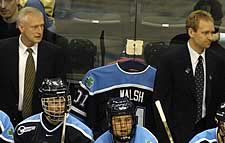
Grant Standbrook (l.) has been a steadying influence, and mentor, for head coaches Shawn Walsh and Tim Whitehead (r.) for 14 years. (photo: Pedro Cancel)
Saturday, now as a trusty assistant to Tim Whitehead, Standbrook gets a chance at number six when the Maine Black Bears face Minnesota for the title.
“My aspirations are weekends like this,” says Standbrook.
Standbrook won a pair of national championships with Johnson, one with his successor at Wisconsin, Jeff Sauer, and two more at Maine under Shawn Walsh. But national championship or not, never has Standbrook’s influence been more apparent, or necessary, than this season.
In late September, just days before the start of training camp, Walsh took a turn for the worse. He died on Sept. 24, leaving a hole in the program, and in the hearts of many of the players.
Suddenly, Whitehead, brought onto the staff just months before, was in charge, and had the daunting task of getting players he hardly knew through a trying situation, and eventually re-focused on hockey.
The Black Bears got off to a tough start, but things improved rapidly from there, and Standbrook’s influence cannot be underestimated. He was the steady thread in the equation, and was able to help Whitehead feel comfortable to be himself.
“Grant’s been the biggest source of support not just for me, but for our team,” says Whitehead. “He’s the connection with all our alums and everyone that’s come through.”
The players also became comfortable enough to accept their new coach, while never forgetting their old one.
“He’s the brains behind this whole program,” says Maine senior Niko Dimitrakos. “He knows so many little things about hockey and life, and he relates that to the guys, and we learn something new from him every day.”
Standbrook proved equally adept at coaching the players through a difficult period of time and coaching them to another Frozen Four.
“He not only knows about hockey, but in life in general,” says Maine forward Martin Kariya. “He knows what to say at the right times, and he helped us more than anyone in that stretch. And now in the playoff run, he’s helping us with hockey. And that’s one of the reasons you come to Maine, because you become a better person and a better hockey player.”
Says Whitehead, “He’s a brilliant hockey mind, that’s for sure, but he’s also a great person, and that’s real important when you’re working with young people, and trying to help educate them not just in hockey, but in life. And Grant certainly can transfer a lot of life’s lessons to the guys very eloquently.”
As Whitehead found out, however, those lessons Standbrook teaches often reach old coaches too.
Walsh made a practical decision last offseason to bring on another experienced Division I coach to the staff, knowing the treatments and effects of cancer could force him to be away from the team for stretches of the season.
The guy Walsh targeted was Whitehead, who once was an assistant under Walsh and Standbrook at Maine, before leaving to become an assistant at Northeastern under another former Black Bear coach, Bruce Crowder.
But, as was often the case over the years, Walsh had to rely on Standbrook to recruit the man they wanted.
“[Walsh] says, ‘You know Grant, he just rejected our offer,'” remembers Standbrook, who was in Florida at the time. “I said, ‘You’re kidding.'”
"Whenever Shawn or I could see a kid, we would, but it’s irrelevant, because everyone has confidence in Grant’s ability to identify quality individuals and quality hockey players."
— Maine coach Tim Whitehead
Whitehead was looking to take a year off, live in Boston, spend time with his family, do some scouting for the NHL’s Vancouver Canucks, and take stock of his career. Standbrook was as congenially relentless as he’d been over the years to land the likes of Dimitrakos, Cory Larose, Jeff Tory, or any number of other players.
“I called Tim again,” says Standbrook. “I said, ‘If you spent a year off, and had a chance to be the head coach at the University of Maine, would that appeal to you? And would anything appeal to you more?
“And he thought about it a moment, and he said, ‘You’re right on, but I put a lot of thought into this, and I’ve discussed it with my wife, and I’m going to sit back and take the year off in Boston. I can’t see myself moving again and going somewhere else.’
“I tried to convince him and he said he stayed up almost all night thinking about our conversation, and he phoned Shawn the next morning. Shawn called me in Florida and says, ‘Hey, he just committed to us.’
“So it may turn out that he’s the best recruit we’ve had.”
Standbrook winds up being someone who’s hard to turn down, not because he’s some slick-talking huckster, but because his common-sense rationale and paternal demeanor exudes a trust and sense of belonging that’s hard to match.
As a result, his reputation is that of a master recruiter.
“I have an opportunity to select the players and also coach, but coaching comes first in my mind and recruiting is a concurrent duty and I’ve been successful at it, so you get that tag,” he says.
His recruiting exploits are such that Standbrook has free reign to jet anywhere in North America to recruit a player, leaving the office on a whim, not telling even the other coaches, and giving no indication as to when he’ll return.
“It’s amazing how people will phone in and say ‘Where’s Grant?'” says Standbrook. “And if they say where I am, they may have an inkling of what I’m doing. You’re better off to say nothing when you’re recruiting. The less you say, the [fewer] cues you give to anyone that might be involved.”
That rare freedom was earned, albeit quickly.
Early in Standbrook’s tenure at Maine, in 1988, Walsh had 40 names he wanted Crowder and Standbrook to evaluate. Standbrook went to see the first 10 and thought they were OK, but not good enough for a scholarship at Maine. Walsh was starting to wonder whether he and Standbrook were on the same page.
“Bruce had a couple guys that he liked, and he wanted me to go out and see them again, because Bruce really liked them, so obviously we differed on our opinion,” Standbrook says. “Shawn couldn’t believe I didn’t like them enough to give them scholarships.”
Standbrook went with Crowder for another look at two particular players, but they sat on opposite ends of the rink, so as not to influence each other.
“During the game, I saw a kid, Jim Montgomery, and another one, Brian Downey,” says Standbrook, who went back to Crowder with his thoughts. “I say, ‘I love those two guys.’ And Bruce says, ‘Thank god.’ And I say, ‘No, no, no, not those two, the other two. I didn’t watch anybody but those other two guys.’
“I was watching the game with blinkers on, and he says, ‘Who the [heck] are you talking about?’
“So we had to phone Shawn and tell him, and Shawn was raging mad. We just held the phone at arm’s length, because I had to tell him that I found two other guys that I liked better. He was wild. [So] he says, ‘OK, I’m coming on the next trip.’
“So the three of us fly out on a private flight to watch a game in Massena [N.Y.], and my two guys that I liked put on a clinic. [Shawn] says, ‘This is the last trip I’ll ever go on.'”
Montgomery and Downey’s places in Maine history are set. And as for the two guys Crowder liked?
“They subsequently went to Northeastern and RPI and played well, so maybe I was wrong,” Standbrook says, chuckling.
But Whitehead knows Standbrook is rarely wrong.
“Grant’s the only one who’s seen the kids before they show up on campus,” Whitehead says. “Whenever Shawn or I could see a kid, we would, but it’s irrelevant, because everyone has confidence in Grant’s ability to identify quality individuals and quality hockey players.
“The advantage Grant might have over some is that he’s been doing it for a lot longer [than other coaches], and has a ton of contacts in both Canada and the United States. He has an eye for talent and, certainly, a way with people which I think is rare.”
Standbrook has been blessed to be afforded those opportunities by some of the greatest minds in college hockey history. It started before his head coaching stint, as an assistant under Dartmouth legend Eddie Jeremiah, considered the top coaching mind of his generation.
It continued under Johnson and Sauer, and then Walsh, a bright, brash young coach who leaned on Standbrook for his steadying influence and experience.
Whitehead says only someone with a rare ability to suppress his ego could be as successful as Standbrook for so long as an assistant.
“That’s one of the reasons he’s so good at what he does, because he doesn’t care who gets the credit, he just wants the team to do well,” Whitehead says. “And I think everyone knows that on our team, and I think that’s why when he says something, the players listen, because his heart’s in the right place.”
If Maine wins its third national championship Saturday, Standbrook’s name may barely be mentioned. But that does nothing to diminish the sense of satisfaction Standbrook will feel, and has already felt over all these years.
“You have to just look at the results,” he says. “You have to be happy with yourself, and you have to know yourself. I know myself.”
And many others are all the better for knowing him, too.
